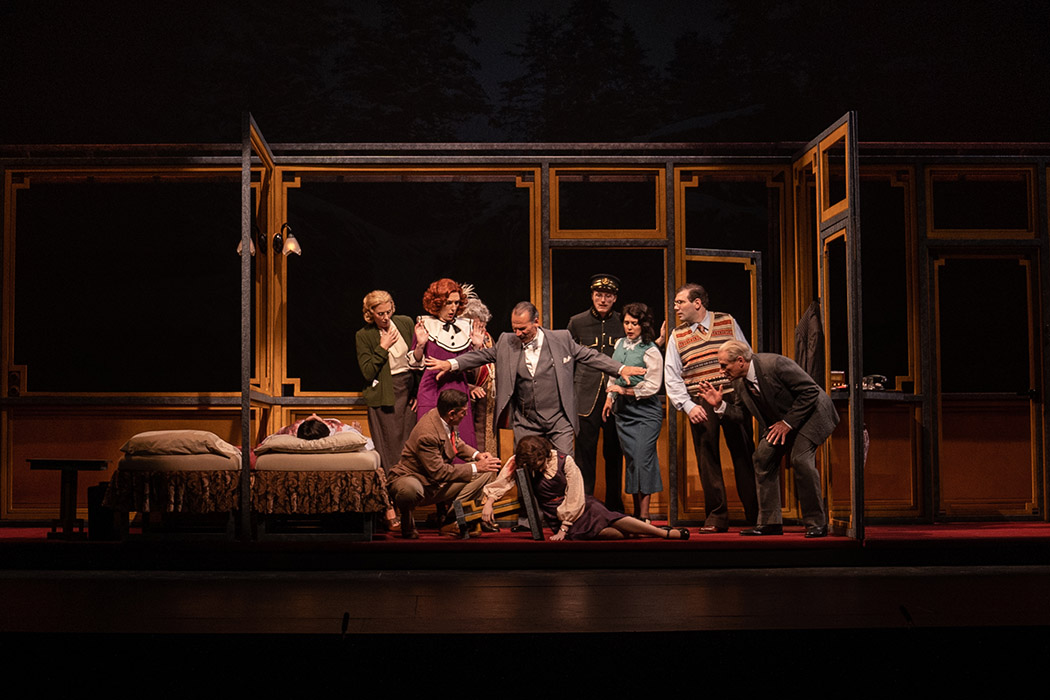As the show curtain rose on DJ Pike’s beautifully atmospheric set for Clarence Brown Theatre’s production of Murder on the Orient Express which opened last week, I halfway expected the audience to break into applause at the sight. But, that would have been a bit premature, for there was even more awe-provoking, kinetic stagecraft to follow and two hours or so of a delicious murder mystery remaining, neatly unwrapped by a marvelous ensemble cast.
Of course, the play is based on Agatha Christie’s classic murder mystery featuring her famous character, Belgian detective Hercule Poirot. The novel was adapted into a stage version by notable playwright Ken Ludwig, who was offered the opportunity at the specific request of the Christie estate. The Ludwig adaptation was subsequently produced by the McCarter Theatre of Princeton, New Jersey, in 2017. Since then, the play has built up a head of steam with theatre companies willing to take on the daunting task of gathering a cast able to handle the sometimes frantic, energetic pace and pacing of the murder mystery genre—and to handle the thorny staging issues of visualizing a luxury train of the 1930s, caught in a snowstorm, and its delightfully cramped spaces.
Staged by veteran CBT director John Sipes, this production delivers the premise with dispatch. The classic mystery is set up when Poirot (Armando Durán) finds that he must return to London from Istanbul, but discovers the Orient Express train fully booked, despite being the off-season. Thankfully, Monsieur Bouc (John Pribyl), the head of the railway company, is an old friend, and offers his personal compartment. Poirot then finds himself in the strange company of an unusually diverse group of fellow passengers who seem to have nothing in common. But do they?

There is the elderly, exiled Russian Princess Natalya Dragomiroff (Carol Mayo Jenkins), traveling with her personal aide, the Swedish Greta Ohlsonn (Rachel Darden). A young woman, Mary Debenham (Rachael Allion), is a mystery herself, along with her apparent lover, Colonel Arbuthnot (David Brian Alley). Then there is the former doctor and present Hungarian royalty, Countess Andrenyi (Christine Sage). Mrs. Helen Hubbard (Katie Cunningham) is an unconstrained wealthy and flirtatious, oft-married women from “Minnesota,” at least that’s what she would like us to believe. Even the train conductor Michel (Guthrie Butler) seems a tad suspicious. Finally, there is the obnoxious and aggressive American “businessman” Samuel Ratchett (Terry Weber) traveling with his secretary Hector MacQueen (Michael Najman). The passengers soon find themselves expressing shock and presenting alibis when Ratchett is found stabbed in his own bed and with the compartment locked from the inside. With the train halted by a snowstorm, its tracks blocked by snow drifts, it falls—of course—to Poirot to solve the murder before the local authorities arrive.
Thanks to several film and television adaptations of Murder on the Orient Express, as well as to the original novel, many in the audience will already know the ending. For all, though, there is the joy of watching the mystery plotting unfold, put into action by a cast of actors skilled at creating memorable characters.

New to CBT audiences, Armando Durán takes on the responsibility of Poirot with a marvelous balance of ego-shrouded vulnerability, attitude, sensitivity, and humor. Ludwig has also given the character of Helen Hubbard a comic, wise-cracking ebullience, material that Katie Cunningham expanded on and finessed, practically capturing every scene she was in with a deliciously cringe-inducing upper-Midwest dialect. CBT veteran Carol Mayo Jenkins once again gave her Princess Dragomiroff the perfect amount of gravity and wit, all wrapped with the voice and variety of deep experience.
Atmosphere is essential to Murder on the Orient Express, and as mentioned earlier, DJ Pike’s set of moving platform wagons backed up with subtle background projections gave the actors the space, often deliberately constrained, that mystery storytelling needs. The suggestions of 1930s period details promoted just the right visual clues. Lighting by designer Josh J. Mullady, too, was an essential part of the play’s atmosphere that depends on hiding and revealing, as well as emphasizing period style. M.J. Hromek’s costumes were perfectly period-aligned and richly descriptive in a 1930s wealth sort of way. And, I was really impressed with Sound Designer Joe Payne’s marvelous subliminal music and effects that underlined mystery plot points.
Murder on the Orient Express is the first production of the Clarence Brown Theatre’s 2022-23 season. It continues through Sunday, October 2. Tuesdays – Saturdays at 7:30 PM and Sundays at 2:00 PM. Tickets and Information






